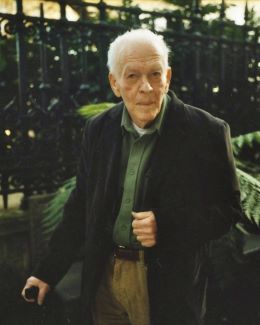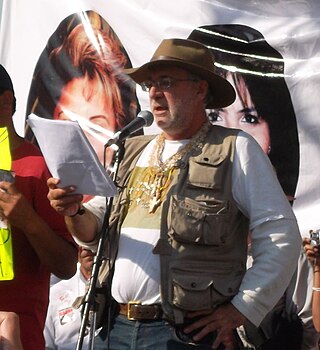
The Zapatista Army of National Liberation, often referred to as the Zapatistas, is a far-left political and militant group that controlled a substantial amount of territory in Chiapas, the southernmost state of Mexico.

The Acteal massacre was a massacre of 45 people attending a prayer meeting of Catholic indigenous townspeople, including a number of children and pregnant women, who were members of the pacifist group Las Abejas, in the small village of Acteal in the municipality of Chenalhó, in the Mexican state of Chiapas. Right-wing paramilitary group Máscara Roja murdered the victims on December 22, 1997, while the Government of Mexico first admitted responsibility for the massacre in September 2020.

Satyāgraha, or "holding firmly to truth", or "truth force", is a particular form of nonviolent resistance or civil resistance. Someone who practises satyagraha is a satyagrahi.

Nonviolence is the personal practice of not causing harm to others under any condition. It may come from the belief that hurting people, animals and/or the environment is unnecessary to achieve an outcome and it may refer to a general philosophy of abstention from violence. It may be based on moral, religious or spiritual principles, or the reasons for it may be strategic or pragmatic. Failure to distinguish between the two types of nonviolent approaches can lead to distortion in the concept's meaning and effectiveness, which can subsequently result in confusion among the audience. Although both principled and pragmatic nonviolent approaches preach for nonviolence, they may have distinct motives, goals, philosophies, and techniques. However, rather than debating the best practice between the two approaches, both can indicate alternative paths for those who do not want to use violence.

Gene Sharp was an American political scientist. He was the founder of the Albert Einstein Institution, a non-profit organization dedicated to advancing the study of nonviolent action, and professor of political science at the University of Massachusetts Dartmouth. He was known for his extensive writings on nonviolent struggle, which have influenced numerous anti-government resistance movements around the world.
Las Abejas is a Christian pacifist civil society group of Tzotzil Maya formed in Chenalhó, Chiapas, Mexico in 1992 following a familial property dispute that left one person killed. When members of the community took the injured man to the nearest town for medical attention, they were accused of attacking him themselves and jailed. When family members realized what had happened, they began a pilgrimage on foot to San Cristóbal de las Casas. Along the way, Christian pacifists in other villages joined the group, which is dedicated to peace, justice, and anti-neoliberalism. Las Abejas freed their companions and grew as an organization.
Civil resistance is a form of political action that relies on the use of nonviolent resistance by ordinary people to challenge a particular power, force, policy or regime. Civil resistance operates through appeals to the adversary, pressure and coercion: it can involve systematic attempts to undermine or expose the adversary's sources of power. Forms of action have included demonstrations, vigils and petitions; strikes, go-slows, boycotts and emigration movements; and sit-ins, occupations, constructive program, and the creation of parallel institutions of government.

Rajagopal P. V. is an Indian Gandhian activist, a former Vice Chairman of the New Delhi Gandhi Peace Foundation, aswell as the president and founding member of Ekta Parishad. In 1972, Rajagopal started working alongside Gandhian activists J.P. Narayan and Subba Rao to disarm 578 bandits in the Chambal region of India. Thereafter, he stayed away from dealing with direct violence and focused on the people of Adivasis, bonded labourers, and other landless communities affected by poverty and exploitation.

Nonviolent resistance, or nonviolent action, sometimes called civil resistance, is the practice of achieving goals such as social change through symbolic protests, civil disobedience, economic or political noncooperation, satyagraha, constructive program, or other methods, while refraining from violence and the threat of violence. This type of action highlights the desires of an individual or group that feels that something needs to change to improve the current condition of the resisting person or group.

The Chiapas conflict consisted of the 1994 Zapatista uprising, the 1995 Zapatista crisis, and the subsequent tension between the Mexican state, the indigenous peoples and subsistence farmers of Chiapas from the 1990s to the 2010s.

On 1 January 1994, the Zapatista Army of National Liberation (EZLN) coordinated a 12-day uprising in the state of Chiapas, Mexico, in protest against the enactment of the North American Free Trade Agreement (NAFTA). The rebels occupied cities and towns in Chiapas, releasing prisoners and destroying land records. After battles with the Mexican Army and police, a ceasefire was brokered on 12 January.
Michael N. Nagler is an American academic, nonviolence educator, mentor, meditator, and peace activist.
Operation Gandhi was a pacifist group in Britain that carried out the country’s first nonviolent direct action protests in 1952.

Aldo Capitini was an Italian philosopher, poet, political activist, anti-fascist, and educator. He was one of the first Italians to take up and develop Mahatma Gandhi's theories of nonviolence and was known as "the Italian Gandhi".

The Nashville Student Movement was an organization that challenged racial segregation in Nashville, Tennessee, during the Civil Rights Movement. It was created during workshops in nonviolence taught by James Lawson at the Clark Memorial United Methodist Church. The students from this organization initiated the Nashville sit-ins in 1960. They were regarded as the most disciplined and effective of the student movement participants during 1960. The Nashville Student Movement was key in establishing leadership in the Freedom Riders.
The Movement for Peace with Justice and Dignity (MPJD) is an ongoing protest movement that began on 28 March 2011 in response to the Mexican Drug War, government and corporate corruption, regressive economic policies, and growing economic inequality and poverty. The protests were called by Mexican poet Javier Sicilia in response to the death of his son in Cuernavaca. The protesters have called for an end to the Drug War, the legalization of drugs, and the removal of then-President of Mexico Felipe Calderón. Protests have occurred in over 40 Mexican cities, including an estimated 50,000 in Cuernavaca and 20,000 in Mexico City.

Javier Sicilia is a Mexican poet, essayist, novelist, peace activist and journalist in Mexico. He contributes to various print media such as the Mexico City daily La Jornada and Proceso magazine. He was founder and director of El Telar, coordinator of several writing workshops, is a film and television writer, editor of Poesía magazine, a member of the editorial board of Los Universitarios y Cartapacios, the National System of Creators of Art since 1995, and is a professor of literature, aesthetics and screenwriting at Universidad La Salle at Cuernavaca and was director of the now-defunct magazine Ixtus.
Meta Peace Team (MPT), formerly Michigan Peace Team, is a nonprofit, grassroots organization founded in 1993 that seeks to pursue peace through active nonviolence and create an alternative to militarism through empowered peacemaking. MPT provides creative nonviolence training workshops to ordinary citizens with a framework of third party nonviolent intervention (TPNI), and it deploys peace teams to conflict areas both domestically and internationally. Its peace teams have worked in places such as Iraq, Haiti, Bosnia, Egypt, Panama, Mexico, Gaza Strip, and the West Bank; they have also been placed within the United States to create peaceful presences at national and state political conventions, Ku Klux Klan rallies, and gay pride parades, among many other events. MPT also works in collaboration with other peace and justice groups around the globe, including Nonviolent Peaceforce, Christian Peacemaker Teams, Veterans for Peace, the International Solidarity Movement, Peace Brigades International, the Shanti Sena Network, and the Metta Center for Nonviolence. Its current offices are located in Lansing and Detroit, Michigan. MPT is a founding member of the Shanti Sena Network.

Diversity of tactics is a phenomenon wherein a social movement makes periodic use of force for disruptive or defensive purposes, stepping beyond the limits of nonviolent resistance, but also stopping short of total militarization. It also refers to the theory which asserts this to be the most effective strategy of civil disobedience for social change. Diversity of tactics may promote nonviolent tactics, or armed resistance, or a range of methods in between, depending on the level of repression the political movement is facing. It sometimes claims to advocate for "forms of resistance that maximize respect for life".

The Rebel Zapatista Autonomous Municipalities were the basic governmental units utilized until 2023 within the de facto autonomous territories controlled by neo-Zapatista support bases in the Mexican state of Chiapas. They were founded following the Zapatista uprising which took place in 1994 and were part of the wider Chiapas conflict. Despite attempts at negotiation with the Mexican government which resulted in the San Andrés Accords in 1996, the region's autonomy remains unrecognized by that government.












